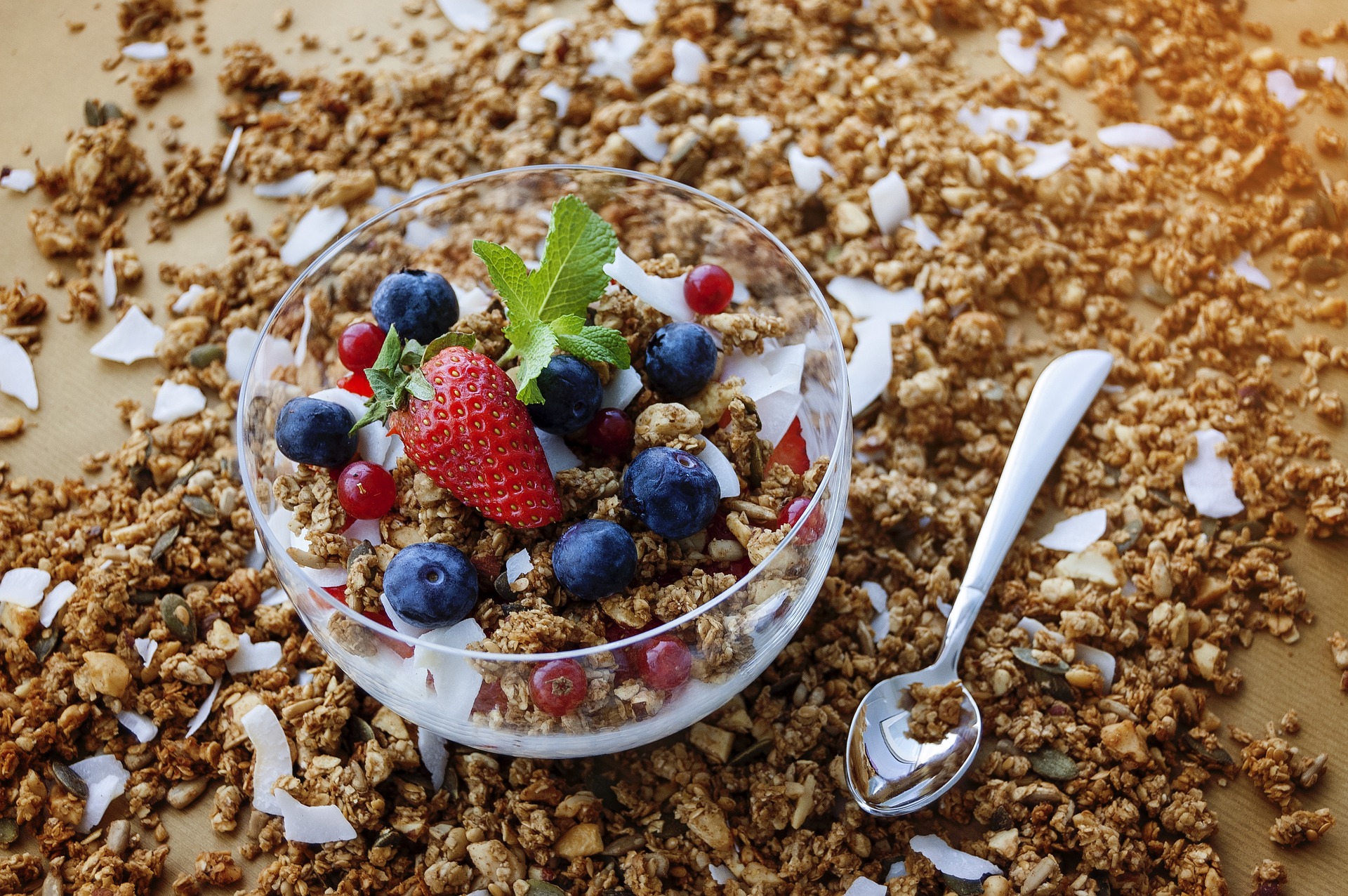Oats and oatmeal are incredibly healthy. Oatmeal is a breakfast staple that’s delicious and full of nutrients you need to get through the day. So, can you eat oatmeal on a plant based diet?
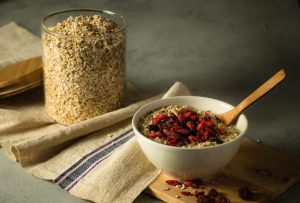
Oats are whole grains that make up an important portion of your plant based diet. Other ingredients usually added in oatmeal are also plant-based. It would not be wrong to say that oatmeal is one of the best breakfasts you can have on your vegetarian diet.
It’s important to understand what happens to oats in your body and what effect they have to fully comprehend their benefits. Also, there are variations in oats that vary in taste and texture. You may find one tastier than the others.
What are Oats and Oatmeal Exactly?
The scientific name for oats is Avena sativa. It’s a whole grain cereal, which is also used for medicinal purposes. When we say oats, we refer to the edible seed of the grassy plant.
Oatmeal is a kind of porridge made using oats. It’s usually the main source of oats for people, but you can also find oats in bread, muesli, granola bars, and other baked items.
You can make oatmeal by boiling oats in water or milk. Overnight oats are another type of oatmeal that does not require boiling as such. You can add fruits, dried fruits, and nuts to make the oatmeal more nutritious and hearty.
Types of Oats
Oats differ in the way they are processed. There’s no significant difference in terms of nutrients between the different types. However, the cooking time, texture, and taste vary.
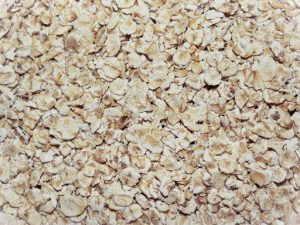
Here are the different types of oats from least processed to most processed:
Oat Groats
This the whole kernel of the oats with only the hull removed, which is inedible anyway. This type has a slightly coarse texture, similar to rice and faro.
These take longer to cook as they are harder. However, they are the most packed with nutrients out of all oats.
Steel-Cut Oats
Steel-cut oats or Irish oats are oat groats cut into two or three smaller pieces with a steel blade. These take relatively less time to cook because of their smaller size.
Scottish Oats
Scottish oats are stone-ground, which give them a porridge texture. These also cook relatively quicker than groats.
Rolled Oats
Rolled oats go through steaming, rolling, and then flattening to turn them into flakes. These are then dried to remove any moisture from the steam.
They have a longer shelf life and take very little time to cook. You can cook these old-fashioned oats in five to six minutes. However, they have slightly fewer nutrients as compared with oat groats and steel-cut oats.
Quick or Instant Oats
Quick or Instant Oats, as their name suggests, take only one or two minutes to cook. They have been heavily processed and grounded into even smaller pieces than rolled oats. You can also find flavored varieties of quick oats.
Nutrients in Oatmeal
Oats and oatmeal are a powerhouse of nutrients. They pack in a variety of nutrients in generous amounts. Even with a single serving, you can attain a lot of the required nutrients for the day.
Here’s a breakdown of calories and nutrients in oats and oatmeal, as per the USDA FoodCentral Database:
| Oats (Dry, Raw) (0.33 cup) | Oatmeal (Rolled oats, cooked in water) (1 Cup) | |
| Calories (kcal) | 102 | 166 |
| Carbohydrates (grams) | 18.3 | 28.1 |
| Fiber (grams) | 2.7 | 3.9 |
| Protein (grams) | 3.5 | 5.9 |
| Fat (grams) | 1.7 | 3.5 |
| Sugar (grams) | 0.2 | 0.6 |
| Calcium (mg) | 14 | 21.1 |
| Magnesium (mg) | 37.3 | 63.2 |
| Potassium (mg) | 97.7 | 164 |
Carbs
So, is oatmeal a carb? Nearly 66% of oats are carbs, so these grains are heavily loaded with this nutrient. Out of this 66%, 85% is starch, and the rest is fiber.
You might think that oats are starchy, and therefore like all other starchy carbs. On the contrary, the starch in oats is quite different. It’s more on the fatty side and readily binds with water.
Moreover, most of the starch content digests and absorbs very slowly. As a result, it does not spike your blood sugar instantly. Therefore, the carbs in oats qualify as good carbs.
Fiber
Most people include oatmeal in their diet to get more fiber. Even within the fiber content, most of the fiber is soluble (beta-glucan). This also results in the slow absorption into the body.
In fact, there’s more soluble fiber in oats than most other cereal grains. All this soluble fiber is found in the bran. So the less processed oats are naturally richer in these fibers.
Protein
Oatmeal is also high in protein, which makes it ideal for those on a plant-based diet. It’s a great source for protein for those who do not consume meat at all.
About 11 to 17% of dry oats is protein, which is relatively higher than other grains. Although there’s a small amount of gluten protein, it’s still safe for people with gluten intolerance.
Minerals and Vitamins in Oatmeal
As you can see from the nutrients chart, oats contain a high amount of Calcium, Potassium, and Magnesium. These minerals are vital for your health. That’s not all, oatmeal also contains many other minerals and some vitamins:
- Manganese
- Copper
- Phosphorus
- Iron
- Selenium
- Zinc
- Vitamin B1
- Vitamin B6
Health Benefits of Oatmeal
Is oatmeal healthy? Oatmeal was the first food product to be granted permission for a health claim from the Food and Drug Administration. Just this fact alone goes to show how healthy oatmeal can be.
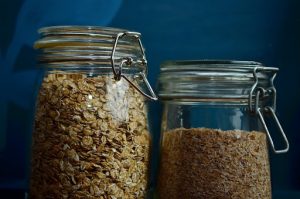
Lowers Cholesterol
Oatmeal can help reduce cholesterol levels, including LDL cholesterol. A study showed that beta-glucan fiber in oats reduces cholesterol.
This happens because of the production of cholesterol bile by these beta-glucans. That, in turn, reduces the circulation of cholesterol in the blood.
High cholesterol levels can lead to heart diseases, which is one of the major causes of death around the world.
Helps Control Blood Sugar
Oatmeal is very effective in maintaining blood sugar levels. Even though it’s a carb, it does not increase blood sugar levels significantly. As a result, it’s an ideal breakfast choice for people with type II diabetes.
A meta-analysis of patients with type II diabetes found that oats reduce blood glucose levels as well as hemoglobin A1c, which tests the average blood sugar levels for two to three months.
Rich in Antioxidants
Oats are rich in antioxidants, but there’s one that’s totally unique to them. They contain a group of antioxidant avenanthramides.
These antioxidants found only in oats can help regulate blood pressure. They do so by producing nitric oxide, which dilates blood. Also, they have anti-inflammatory properties.
Another important antioxidant in oats is ferulic acid. Oats also contain phenolic plant compounds in addition to antioxidants.
Helps in Weight Loss
Many weight-loss diets include oatmeal in breakfast. One of the reasons for that is it’s quite filling. With one bowl of oatmeal in the morning, you’re good for hours, especially if you practice intermittent fasting.
An article from Nutrition Research states that the beta-glucan in oats produces peptide YY. This hormone is a satiety hormone that responds to calorie intake. As a result, your stomach feels full, and you end up consuming fewer calories.
Improves Digestion
Anything high in fiber is great for digestion, especially in resolving constipation. This is a common problem for the elderly, as they experience irregular bowel movements.
The fiber in the oats can regulate digestion and improve nutrient absorption. In fact, it’s a great alternative to laxatives for the elderly.
Great for Skin
Oats have been used in skin care products for a very long time. If you read colloidal oatmeal in the ingredients, the product contains very fine grains of oats. The anti-inflammatory and anti-itch effects of the antioxidants make this product of oats effective for skin irritation and eczema.
Oats also contain saponins, which can remove dead skin cells and cleanse the skin. Most people use oats as a scrub or use creams with colloidal oatmeal. However, who is to say that eating oatmeal cannot benefit your skin too?
Oatmeal Recipes for Plant-based Diets
Oatmeal does not have to be boring. You can make it interesting with your own spin by adding your favorite fruits and nuts. If you don’t consume milk in your plant-based diet, opt for plant-based milk options or no milk.
Overnight Oats
Overnight oats are a great way to optimize the nutritional benefits of oats. This simple and healthy oatmeal recipe gives you a lot of variety in terms of flavors and textures. This is something you can eat almost every day with variation every now and then.
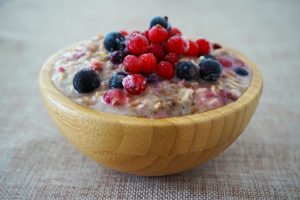
The basic ingredients are oats, vanilla extract, nutmeg, and cinnamon. You can customize the fruits and nuts.
A combination of frozen berries, raisins, chia seeds, sunflower seeds, walnuts, sliced almonds, and chopped cashews, will give you a nutrient powerhouse of a breakfast. Try this recipe with your favorite ingredients!
Oatmeal Cookies and Muffins
Most people think of oatmeal as a breakfast food. You can even snack on oatmeal. For starters, oatmeal cookies and muffins are super healthy and downright delicious. There are quite a lot of varieties in the market. Alternatively, you can bake them at home and eat fresh.
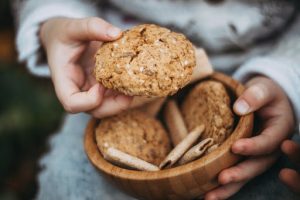
You can make your plant-based snacks more healthy and fun with these two variations. Make sure to find those that are oilless, as you don’t want to consume too many carbs with fat.
Savory Oatmeals
If you want to bring a twist to your oatmeal, bring some savory flavors in it. This Savory Oatmeal recipe from Forks Over Knives is really quick. It’s for one of those days when you’re feeling bored of eating oats.
FAQs
Is Oatmeal Gluten-free?
Oats are gluten-free and safe for those with gluten intolerance. The only issue is contamination. Sometimes manufacturers use the same equipment to produce other grains like wheat and barley. It’s pretty minimal, BUT if you are highly sensitive or allergic to gluten don’t take a chance. Make sure to read the labels and choose a brand that does not share equipment. The labels should clearly state “Gluten-Free” or “Gluten-Free Certified”.
There are pure oatmeals labeled as gluten-free in the market. To be extra cautious, you can use those products. Some good GF brand options to consider are Avena Foods and GF Harvest.
Is Oatmeal Keto?
Oatmeal is high on carbs, which is why it’s not a good fit for the keto diet. Even though they are extremely nutritious, they don’t have a high amount of protein. This is all the more important for those just beginning their keto diet.
Keto is a low-carb, high-protein diet, so you would have to stop eating oats, even if you love them. That said, you could enjoy oatmeal in very limited quantities, as long as your carb intake stays under 50 grams.
What is Oatmeal Milk?
Oatmeal milk is basically blended oats. You just blend oats with water in a blender until they get smooth. Then, you can strain it to remove any pulp or flakes.
The best oats for oatmeal milk are rolled/old-fashioned oats. Oatmeal milk is a nutritious and tasty milk, free from carrageenan. Also, you can use it in your coffee to get a mild oats flavor.
Which Oatmeal is the Healthiest?
Oat groats are the healthiest out of all oats options. These are the least processed, so even richer in fiber and other nutrients. It does take more time to cook, but you get the benefits of using oats in their purest form.
As for other types of oats, making overnight oats could pack in more nutrients. The other ingredients you add in the oatmeal like fruits and nuts can also impact the overall nutrients. However, any kind of oatmeal is essentially super healthy.
Wrap Up
So, Yes, you can eat oatmeal on a plant based diet. It’s one of the best carb-rich foods you can consume to get your daily fuel. Also, it’s a quick and easy breakfast meal, especially overnight oats.
You can also find oats in whole grain muesli if you want to mix things a bit. Even simple oatmeal without fruits and nuts can benefit you. Although fresh fruits and nuts really elevate the flavor profile.
You may also like: HOW DO YOU MAKE OVERNIGHT OATS? >>CLICK HERE!

